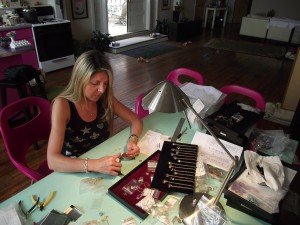
Two years ago, New Rochelle jewelry designer Georgianna Koulianos found her misfortune double for having hitched the fortunes of her small business to Fortunoff, the twice-bankrupt jewelry and home furnishings company.
Two years later, Fortunoff is back in the fine jewelry business under new ownership that includes members of the 89-year-old retail company”™s founding Fortunoff family.
Koulianos, though, struggles to keep her small business afloat while facing yet another legal and financial misfortune brought on by the 2009 bankruptcy of Fortunoff”™s former owner, an affiliate of National Realty and Development Corp. (NRDC) Equity Partners L.L.C in Purchase.
In 2008, the owner of GK Designs Inc. lost about $70,000 due her for jewelry shipped to Fortunoff when a previous owner of the Long Island-based company filed for Chapter 11 protection in U.S. Bankruptcy Court. An unsecured creditor, her attempt to reclaim her jewelry was denied. She and other vendors went unpaid when NRDC Equity Partners paid $110 million to buy Fortunoff out of bankruptcy and the bankruptcy case was dismissed.
”˜We let it slide”™
Like numerous other vendors in the metropolitan area, Koulianos later that year jumped at the chance to supply the new owner”™s Fortunoff jewelry boutiques planned for Lord & Taylor stores. Fortunoff buyers told her that her jewelry would go into 47 Lord & Taylor stores when placing an order with her.
When the revived Fortunoff bounced a $1,100 check to GK Designs, Koulianos was seized by a bad case of déjà vu. In early 2009, Fortunoff”™s new owner filed for Chapter 11 protection from creditors; the bankruptcy was converted to a Chapter 7 liquidation later that year.
Koulianos was among 30 to 40 vendors who tried to join forces to collect payment for their shipped merchandise.
“We couldn”™t find a lawyer to represent us as a group, so we let it slide,” she said recently at her residence in Knickerbocker Lofts, where she now runs her cash-strapped business. Lawyers had told the vendors, many of whom like Koulianos also lost payments due them in the first Fortunoff bankruptcy, that the 45-day period in which they could reclaim their goods had expired.
“They accepted delivery from me five weeks prior to filing for bankruptcy,” the jewelry designer said. “Do you mean they didn”™t know they were filing for bankruptcy five weeks later?”
About $50,000 worth of GK Designs jewelry was included in the 2009 liquidation sale.
After the two bankruptcies, her business was out about $120,000 “that they never paid me,” she said.
Adding to the financial woes
Koulianos”™ company”™s cash flow was further drained by the recession and economic downturn. She said she lost her largest retail client, Bloomingdale”™s, when she told the high-end retailer she could no longer accept her returned goods in lieu of payment.
The twice-burned designer was forced to part with her two full-time employees two years ago and dropped her part-time help a year later. She gave up her leased Manhattan office and moved her business to her New Rochelle loft.
More than a year after the start of her 2009 misfortune with Fortunoff, Koulianos received a letter from Manhattan attorney Ian J. Gazes, the Chapter 7 trustee of the Fortunoff estate. Gazes demanded she repay a total $47,659 for GK jewelry shipped prior to the company”™s bankruptcy filing. Because she was paid within 90 days preceding Fortunoff”™s bankruptcy petition, the remittances were considered “preferential payments” under the U.S. Bankruptcy Code, Gazes wrote.
Gazes later last year offered to settle for $42,873.10, a 10 percent discount. Koulianos said she did not hear back from the attorney after she replied to a further reduced settlement offer of $2,000.
A call to Gazes seeking comment for this story was not returned at press time.
When Koulianos failed to settle, the trustee this year had the bankruptcy court issue a certificate of default. Ezra Glaser, her newly retained attorney in Manhattan, said he is working to have the default order vacated before a court judgment is entered against her.
“I”™m in shock this is allowed to happen,” Koulianos said. “There is no protection for small businesses. They count on that small businesses can”™t afford to fight them, so they”™re bullying us.”
”˜A very inequitable system”™
The trustee”™s claim for payment from Koulianos is common in bankruptcy cases, said Jonathan S. Pasternak, a bankruptcy attorney and partner at Rattet Pasternak L.L.P. in Harrison.
He said claims against vendors can be made up to two years after a bankruptcy petition is filed. Bankruptcy trustees can claim vendors received preferential payments if specific repayment terms between a supplier such as Koulianos and a company such as Fortunoff were not followed, he said.
“Generally these vendors get sued even if that was the case” that agreed-to terms of repayment were followed, Pasternak said. “It”™s a very inequitable system, unfortunately.”
That section of the bankruptcy code was not intended to further penalize creditors such as Koulianos already financially harmed by a bankrupt company. “The whole idea behind a preference law is they were looking to punish or recapture from vendors who were getting specialized repayment terms versus others who were getting nothing,” Pasternak said.
Pasternak said the law was changed in 2005 to make defenses against such lawsuits easier for vendors. “These are more defensible than ever but they do get sued routinely,” he said.
“Where is the law that helps small businesses?” said Koulianos. “Not just for myself but for other businesses, something needs to be put in place to keep things like this from happening. There needs to be some law that protects the honest business person.”

















